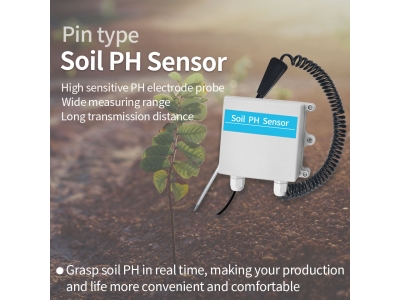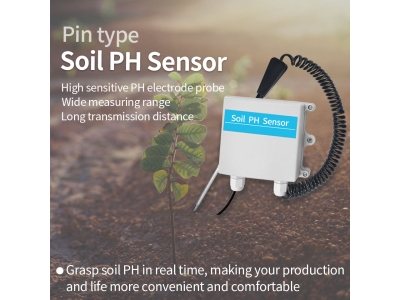the agricultural industry has witnessed a major transformation through the integration of advanced technologies. One such technology that is revolutionizing farming practices is smart soil management, enabled by the use of advanced soil sensor solutions. These sensors provide real-time data about soil conditions, allowing farmers to make informed decisions and optimize their agricultural practices. This article explores the concept of smart soil management and highlights the benefits and applications of advanced soil sensor solutions in maximizing agricultural efficiency.

Understanding Smart Soil Management
Smart soil management refers to the implementation of data-driven approaches to optimize soil health and fertility. It involves the collection, analysis, and utilization of real-time data about soil conditions, which is made possible through the deployment of advanced soil sensor solutions. By monitoring key parameters such as moisture levels, nutrient content, pH, temperature, and salinity, farmers can gain valuable insights into the health and quality of their soil. This information enables them to tailor their agricultural practices, including irrigation, fertilization, and crop rotation, to maximize productivity while minimizing resource inputs.
Benefits of Advanced Soil Sensor Solutions
Precision Agriculture: Advanced soil sensor solutions enable precision agriculture by providing accurate and real-time data about soil conditions. This allows farmers to optimize their farming practices, ensuring that crops receive the right amount of water, nutrients, and other inputs. Precision agriculture leads to improved crop yields, reduced resource wastage, and increased profitability.
Resource Efficiency: By monitoring soil moisture levels, advanced soil sensors help farmers optimize irrigation practices. Over-irrigation can lead to water wastage and leaching of nutrients, while under-irrigation can result in crop stress and reduced yields. With precise soil moisture data, farmers can apply water efficiently, reducing water consumption and associated costs.
Nutrient Management: Advanced soil sensors provide insights into the nutrient content of the soil, allowing farmers to optimize fertilizer applications. By tailoring fertilizer inputs based on real-time soil nutrient data, farmers can ensure that crops receive the right amount of nutrients, minimizing fertilizer waste and environmental pollution.
Disease and Pest Control: Soil sensors can detect changes in soil conditions that may indicate the presence of diseases or pests. By continuously monitoring soil parameters such as temperature and moisture, farmers can identify early warning signs and take preventive measures. Timely intervention helps minimize crop damage and reduces the need for chemical pesticides.
Sustainability: Smart soil management contributes to sustainable agricultural practices by optimizing resource utilization and reducing environmental impacts. By minimizing water and fertilizer wastage, farmers can conserve resources and reduce their carbon footprint. Additionally, by adopting precision agriculture techniques, farmers can minimize soil erosion and improve soil health over the long term.
Applications of Advanced Soil Sensor Solutions
rrigation Management: Soil sensors play a crucial role in optimizing irrigation practices. They provide accurate and real-time data about soil moisture levels, allowing farmers to schedule irrigation events based on actual plant needs. This prevents both under- and over-irrigation, leading to improved water use efficiency and crop yields.
Nutrient Management: Advanced soil sensors enable farmers to monitor soil nutrient levels and make informed decisions about fertilization. By analyzing nutrient data, farmers can apply fertilizers more precisely, reducing nutrient leaching and minimizing environmental pollution. This promotes sustainable agricultural practices while maintaining optimal crop nutrition.
Crop Rotation and Planning: Soil sensors can help farmers determine the suitability of different crops for specific areas of their land. By monitoring soil conditions, including pH, nutrient levels, and disease prevalence, farmers can make informed decisions about crop rotation and planning. This promotes crop diversity, reduces disease risks, and improves overall soil health.
Environmental Monitoring: Advanced soil sensors can be used to monitor soil parameters beyond the scope of traditional agriculture. For example, they can track soil carbon levels, which has implications for carbon sequestration and climate change mitigation. By integrating soil sensors into environmental monitoring programs, farmers can contribute to broader sustainability initiatives.
Future Directions
The future of advanced soil sensor solutions in smart soil management holds immense potential. Some areas of development and research include:
Integration with Data Analytics and Artificial Intelligence: By combining soil sensor data with advanced analytics and artificial intelligence algorithms, farmers can gain deeper insights into soil conditions. This will enable predictive modeling, early disease detection, and customized recommendations for optimal crop management.
Wireless Sensor Networks: The deployment of wireless sensor networks can enhance data collection coverage and scalability. By connecting multiple soil sensors over a wide area, farmers can obtain a comprehensive understanding of soil conditions across their entire farm. This will facilitate better decision-making and resource allocation.
Adoption of Internet of Things (IoT) Technologies: Integrating soil sensors with IoT platforms and cloud-based systems will enable seamless data sharing and remote monitoring. Farmers can access real-time soil data through mobile applications or web interfaces, allowing them to make timely decisions regardless of their physical location.
Enhanced Sensor Durability and Longevity: Improving the durability and longevity of soil sensors will ensure long-term reliability and cost-effectiveness. This includes developing sensors that can withstand harsh environmental conditions, have low power consumption, and require minimal maintenance.
Conclusion
Smart soil management, powered by advanced soil sensor solutions, is transforming the agricultural industry. By providing real-time data on soil conditions, these sensors enable farmers to optimize their practices and maximize agricultural efficiency. The benefits of smart soil management include precision agriculture, resource efficiency, improved nutrient management, disease control, and sustainability. As advancements in sensor technology continue, the future holds even greater opportunities for enhancing smart soil management through data analytics, wireless networks, IoT integration, and improved sensor durability. Embracing these technologies will pave the way for a more sustainable and productive agricultural sector, ensuring food security for future generations.






